|
 |
|
|
|
|
Among
the genre pictures, horror movies have the least consensus when it comes to
what the good ones are and even what qualities a good one should have. They
nearly all have low budgets and often all the difficulties that implies: cheesy
sets and costumes, poor lighting and camera work, amateurish acting, writing,
and directing. To partisans, those limitations test the creators' innovation
and the strength of their ideas. To detractors, they make the films infinitely
risible. Furthermore, horror movies are personal in a way that film noir
or musicals, etc. are not, and the particular set of neuroses a horror movie
exploits must match those the viewer already has or else it will not be effective.
Thus, while western fans agree that John Ford is an exemplary director of westerns,
if you praise John Carpenter to a David Cronenberg fan you could be asking for
a fight. (I'm one of those Cronenberg fans, by the way, so don't even talk to
me about how much you liked Halloween or any other movie made by that
ridiculous hippie.) |
|
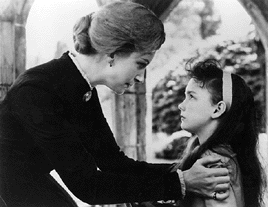 Deborah
Kerr & Pamela Franklin in
Deborah
Kerr & Pamela Franklin in
The Innocents |
|
Further
than that, horror movies can be divided into numerous sub-genres (zombie, vampire,
werewolf, anti-Catholic propaganda, and so on) which appeal to different segments
for different reasons. One of the trickiest to pull off is the ghost movie.
The special effects in ghost movies are frequently limited to lame-o double
exposures and stuff attached to monofilaments yanked around a set, interactions
between the living and the dead tend to be trite and easily resolved, and too
many filmmakers succumb to the temptation to use ghosts as a metaphor for something
or other rather than dealing with them in their own right. And while ghost movies
literally deal with conflicts between life and death, they too often turn into
therapeutic exercises which not only diminish the differences between the two
states of being, they become positively death affirming. But don't be fooled--ghosts
are trouble and don't you forget it. |
|
A recent offender against
sense and the living is 1999's The Sixth Sense, which betrayed its
initial spookiness with a ludicrous plot point that trivialized the murder
of a child, and ended by suggested that the tortured spirits of those who
had murdered or been murdered, or executed, or committed suicide could be
assuaged by a chat with a little boy. In fact, counseling the dead becomes
the boy's calling. For a corrective, Stir of Echoes, which came out
the same year and had a similar plot, but honored the plights of the children-both
living and dead.
Also released in 1999
was the remake of The Haunting. Like The Sixth Sense, it proposes
a living character should spend her life succoring the dead. In this case,
a lonely spinster who spent her life nursing an ungrateful parent sacrifices
it to become nanny to hundreds of dead children. This is a far cry from 1963
version and Shirley Jackson's source novella in which she is flattered by
the attention the conniving ghosts of Hill House give her, then cruelly betrayed
by them moments before her painful death. |
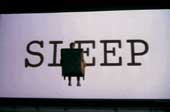
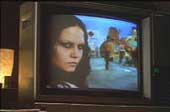
From
Stir of Echoes
|
|
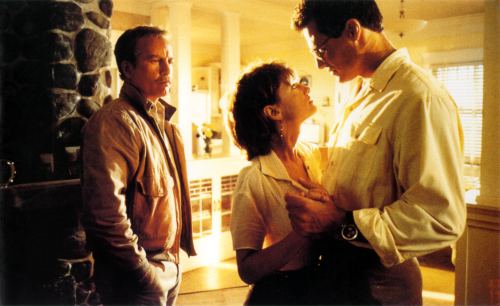 "Remember,
you're still my girl." Richard Dreyfuss, Holly Hunter, Brad Johnson in
Always
"Remember,
you're still my girl." Richard Dreyfuss, Holly Hunter, Brad Johnson in
Always |
Perhaps
most troubling of the pro-ghost, and therefore, pro-death, movies are "romances"
like The Ghost and Mrs. Muir and Ghost. In these, widows pledge
their eternal love to ghosts and await their own demises with patient celibacy.
These are Poe-like compacts that condemn the living and inhibit life, directly
by frustrating procreation, and indirectly by transforming death from an event
to an ever present component of life. The heroines may live in nice houses,
but they are sepulchers all the same. To take ghosts seriously in a narrative
they must be granted motives and agendas not shared by the living, and that
should be equally true of |
|
the scary looking ones
and those that look like they got a really super skin peel at Burke-Williams.
"Remember, you're still my girl," says the departed lover in Always
(a remake of 1943's A Guy Named Joe, which can be glimpsed on TV in
Poltergeist), which would be a sweet thought except as the movie progresses
it becomes increasingly obvious that that possessiveness (she is in a real
way possessed by him) is damaging to her mind, health, and future. He is hurt,
too. "Anything you do for yourself now is a waste of spirit," his guide tells
him. They must be rid of one another for either to thrive. (Truly, Madly,
Deeply shares many of these qualities, but is more a parable of divorce--in
death, the husband becomes an infertile lay about with dubious friends-than
a genuine ghost movie.) |
|
Even
well meaning ghosts do not necessarily act in the best interests of living humans.
In The Frighteners, a conman has ghosts as partners in an exorcism scam
he runs. The problem, as in most of Peter Jackson's movies, is that over involvement
with un-reality (zombies in Dead Alive, "the fourth world" in Heavenly
Creatures) leads to a badly neglected and unstable private life. The
king of Halloween tries to annex Christmas in Tim Burton's the Nightmare
Before Christmas and ends up giving toddlers severed heads as gifts. In
the Tim Burton directed Beetlejuice, the living and the departed only
learn to co-exist after the ghosts take over most of the house they share, dictate
the décor, and raise the human daughter whom they nearly inadvertently affianced
to an otherworldly pervert. Speaking of otherworldly perverts, the ghost in
The Legend of Hell House was allowed to do something |
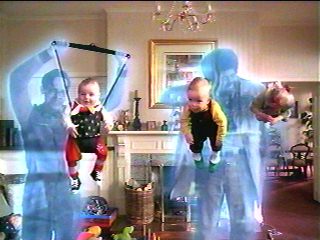 Jim
Fyfe & Chi McBride in The Frighteners
Jim
Fyfe & Chi McBride in The Frighteners |
|
unspeakable
because it persuaded a young woman it was sweet and nice. For more in that vein,
you could rent the sleazy The
Entity, but it's quite graphic and has a silly ending. |
|
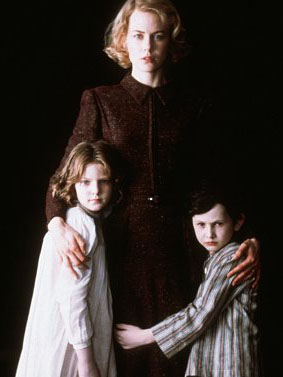 Nicole
Kidman, Alakina Mann, and James Bentley in The Others Nicole
Kidman, Alakina Mann, and James Bentley in The Others |
|
While Ghost
is certainly horrible, if you are looking for ghost films that are also
top notch horror movies I've got a short list for you to consider. Still
in theaters is writer-director Alejandro Amenabar's The Others.
While it might be too early to call it a classic, it's got the right bones
and an outstanding performance from Nicole Kidman (because it's so new
I don't want to ruin anybody's fun by writing about it here, just check
it out). Second is Poltergeist. Poltergeist
is nearly twenty years old, so I checked it out on dvd last weekend to
see how the special effects were holding up. Some better than others,
as it turns out, but whether you are convinced by the guy scratching the
flesh off his face (and you won't be) is secondary to its strength of
writer-producer Steven Spielberg's thesis: unregulated material, whether
violence on television or drugs in the bedroom, is dangerous to the family
("Don't watch that, honey, it's bad for you," the mother says and carelessly
turns the channel from static to a war movie) but the family is strong
and resilient and can be reborn in the face of adversity (the whole graveyard
thing is just a ruse). Plus, it was the first ghost movie I ever saw that
gave a convincing explanation as to why the family didn't just leave.
|
|
The
all time champion of ghost movies is the 1962 film The Innocents, produced
and directed by Jack Clayton, starring Deborah Kerr, and adapted by William
Archibald and Truman Capote from The Turn of the Screw by Henry James.
Frankly, when you get a group of such notables working on a horror movie you
end up with a mess like 1963 The Haunting (I said it was better than
the remake, but it's still pretty boring overall), The Exorcist, Wolf,
or more recently, From Hell (they got that title right). |
|
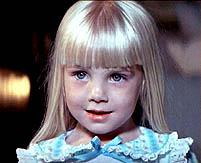 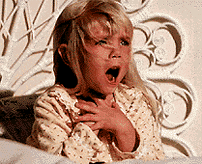 Heather
O'Rourke in Poltergeist
Heather
O'Rourke in Poltergeist |
|
But
The Innocents contains all of the best elements of a ghost movie and
none of the idiocies. It tells the story of a sheltered woman who is put in
sole charge of two orphans because their only living relative is too selfish
to care for them, or even to see them. She finds that in their pampered neglect,
the children have become strange--attractive and charming to be sure, but also
afflicted early with aristocratic decadence. They are unnaturally attached to
one another, and also to something in the house which the woman comes to believe
are meddling spirits. She believes this not because she hears a spooky noise
or detects some unexplained movement, but because she sees them-and though they
seem to be as concrete as any living human they are much more disturbing than
anything in Poltergeist's arsenal of spooks not because of how they look,
but |
|
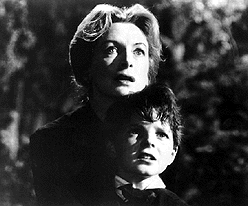 Deborah
Kerr & Martin Stephens in The Innocents
Deborah
Kerr & Martin Stephens in The Innocents |
|
because of the corruption
they represent in the woman and her charges. The little boy's goodnight kiss
is a little too…affectionate, for example, and the woman lets it go on a bit
too long. And though the case for an actual infestation of ghosts is largely
circumstantial, they are part of a force field of perversion that encompasses
the house and lays waste to the best intentions, and their effect upon the
residents are irreducible, and haunting in every sense.
Written by Sharon C. McGovern
From
Vol. 33
Back to Cobra Movies
Back to the
Cobra's Ghost |
 |
 |
 |
 |
 |
 |
 |
 |
 |
 |
 |






 Nicole
Kidman, Alakina Mann, and James Bentley in The Others
Nicole
Kidman, Alakina Mann, and James Bentley in The Others

